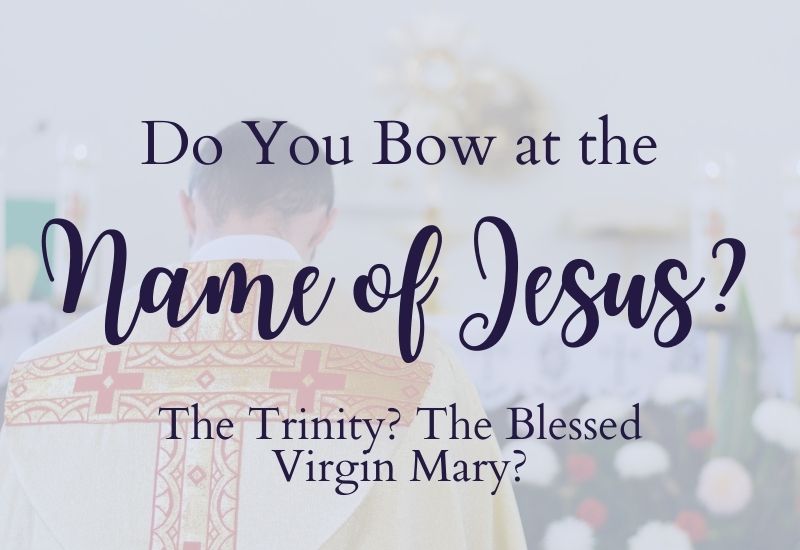One big difference protestants notice at the Holy Sacrifice of the Mass is all the bowing and kneeling. For some reason or another, prostrating oneself to the Lord has stopped by many Christians. Or it’s been replaced by swaying and raising hands to God in more charasmatic circles.
(No comment from me about Catholics who’d like for this to be common practice at Catholic Mass . . .)
Most Catholics understand that God deserves our adoration and special focus. We cannot do anything to earn his abundant mercy, so we need to do everything we can to glorify his goodness and tell others about it!
And what better way to do so than to show people that our daily lives revolve around God and not ourselves?
So, why do Roman Catholics (and certain flavors of Anglicans) make the sign of the cross, bow at the name of Jesus, and genuflect toward the tabernacle?
Reverence. God, the holiest of holies, has it coming to Him! The Creator of the heavens and the earth always deserves our adoration and worship. It is especially important when Christians are in the presence of Jesus’s Body in the tabernacle or exposed during adoration that we treat the space and moment quietly, carefully, and reverently.

*Note: bowing your head at the name of Jesus, genuflecting, or making the sign of the cross aren’t just Catholic traditions. I go more into this in detail below, but I truly believe that all Christians would benefit from incorporating more devotion to the Most Holy Name of Jesus in their daily lives. It’s a fabulous daily reminder of the magnificence of the hypostatic union (Christ being 100% God, 100% man) and that God deserves our physical adoration (every knee shall bow!)
Who being in the form of God, thought it not robbery to be equal with God: [7] But emptied himself, taking the form of a servant, being made in the likeness of men, and in habit found as a man. [8] He humbled himself, becoming obedient unto death, even to the death of the cross. [9] For which cause God also hath exalted him, and hath given him a name which is above all names: [10] That in the name of Jesus every knee should bow, of those that are in heaven, on earth, and under the earth:
[11] And that every tongue should confess that the Lord Jesus Christ is in the glory of God the Father.
Philippians 2:6-11
Worshipping God by bowing / prostrating ourselves is Biblical and just makes sense. His Name is above all others. Why should we treat it the same as any other name?*
In this second post of a three-part series, I share why Catholics bow and how/when they traditionally ought to do so. If you would like to read the other posts in this series, here are the links:
- What is genuflecting and why do Catholics do it?
- Catholics Absolutely Should Be Bowing At The Name Of Jesus!
- Crossing yourself inside and outside of the Holy Sacrifice of the Mass
What Types of Bows Do Catholics Use?
There are two main types of bows: a head nod (or “bow of the head”) and a profound bow. The head nod is simply a bow at the neck. A profound bow is one from the waist. Both of these bows are performed slowly and reverently–with purpose. Catholics bow out of love and respect for God, so why not put a little extra time and thought into a gesture of adoration?
During the Holy Sacrifice of the Mass, it is appropriate to perform a profound bow (or even genuflection) when the Incarnation of Christ is proclaimed. The most common time this happens is during the Nicene Creed: “For us men and for our salvation he came down from heaven, *profound bow* and by the Holy Spirit was incarnate of the Virgin Mary, and became man.’ *end of bow*
Head nods are appropriate all over the place during Mass and in everyday life. To honor your priest’s ordination and vocation, you might nod toward him during the procession.
At the name of Jesus Christ (Jesus, Christ Jesus, Jesus Christ), it is meet and right to nod your head–Jesus is our Lord and Savior after all. His Most Holy Name deserves to be praised and this is a simple way to do so in public or private.
When Do Catholics Bow?

The reason for bowing is similar to the reason for genuflecting. Here’s a short quote from my post on why Catholics genuflect:
“Catholics are commanded to love the Lord with all our heart, soul, and mind (Matthew 22:37). The action of [bowing] is a physical manifestation of that devotion and servitude to the will of God and the physical presence of Jesus in the Eucharist.”
According to the General Instruction of the Roman Missal (and a great article from churchmilitant.com):
“a) A bow of the head is made when the three divine Persons are named together and at the name of Jesus, Mary and the saint in whose honor Mass is celebrated.
b) A bow of the body, or profound bow, is made: toward the altar if there is no tabernacle with the Blessed Sacrament; during the prayers, ‘Almighty God, cleanse’ and ‘Lord God, we ask You to receive;’ within the profession of faith at the words, ‘by the power of the Holy Spirit;’ in Eucharistic Prayer I (Roman Canon) at the words, ‘Almighty God, we pray.’ The same kind of bow is made by the deacon when he asks the blessing before the gospel. In addition, the priest bends over slightly as he says the words of the Lord at the consecration. [1]”
Let me clarify that second statement about bowing toward the altar:
- If Jesus is not present in the Blessed Sacrament (His presence is usually indicated by a lit, red candle hanging in the sanctuary) you bow toward the altar before getting in your pew / approaching the altar.
- If Jesus is present in the tabernacle, you genuflect (knee to the ground, folks!! Unless your body is really not working for you, it’s really not hard to get down there. I’m still genuflecting–knee gently to floor–at 31 weeks pregnant. Just use the pew as a support. Maybe I’m too particular, but the awkward curtsy-shuffle before entering the pew instead of an intentional genuflection is just going through the motions.)
- If Jesus’s Body in the Blessed Sacrament is exposed (during Benediction or Adoration of the Blessed Sacrament) it is customary to perform a double genuflection. (More on that in my post about why Catholics genuflect.)
Whenever the name of Jesus, Mary, or a saint being honored is mentioned, it is customary for Catholics to respond with a head nod. This small bow acknowledges the adoration and respect Catholics have for these holy names and the power that their intercession and names hold.
Bowing at the Most Holy Name of Jesus
The name of Jesus is incredibly powerful. Throughout the Bible, the name of Jesus is exalted (Philippians 2:9-11) and is used to cast out demons (Mark 16:17). In addition, when glorious mysteries of the Catholic faith such as the three Persons of God are named together (during the ‘Glory Be’) or the Incarnation (during the Nicene Creed) Catholics should bow reverently to attest to the sanctity and goodness of God.
In my experience, bowing during the Holy Sacrifice of the Mass has increased my personal devotion and helped me focus on the Sacrament being celebrated. Whenever the Incarnation of Jesus is mentioned, I nod and ponder the wonderful gift Catholics are given every day:
In the Eucharist, Jesus transubstantiates and is present on the very earth we live on. When the bread is consecrated, I bow my head before gazing upon the Body of Jesus silently praying “My Lord and my God.” Whenever Mary, the Immaculate Mother of God is mentioned, I do a head nod indicating her important role in our salvation and God creating her as sinless to “magnify” His Son.
Bowing at the name of Joseph and Mary might seem controversial to some. But if you’ve ever heard an exorcist discuss the intercessory power Mary wields in casting out demons or you know of Joseph’s title ‘Terror of Demons’ or simply acknowledge the importance and beauty of the Holy Family–I don’t see why folks would have a problem nodding their heads out of reverence for the holiness God granted them.
Bowing Outside of Mass–Especially When Others Use the Lord’s Name in Vain
Catholics are charged with respecting the name of the Lord and all holy things in the Ten Commandments . . . it is third on the list:
“Thou shalt not take the name of the Lord thy God in vain; for the Lord will not hold him guiltless that taketh his name in vain.”
(Exodus 20:7)
Obviously, this commandment indicates Christians are not to curse or blaspheme the name of God (or His mother or holy things). It is important to note there are other ways to utilize His name in vain like making fun of God or His commandments or failing to maintain respect for His name and the power it holds.
If anybody uses the Lord’s name in vain in front of you, don’t laugh it off or ignore it–tell them it bothers you. If all Christians respected the Lord’s name and acted like it by bowing at His name throughout daily life, perhaps secular people would be more cautious in what company they take the Lord’s name in vain.
A spiritual director once advised a class I was taking that if ever Jesus or Marys’ names were used (inside or outside of Mass), we ought to give a small head nod out of respect and adoration. If the person using their name is doing so in vain, this small action could make them think twice before cursing the Lord’s name again.
The pious act of bowing out of love for God should be utilized not only during the Holy Sacrifice of the Mass but also in Catholics’ everyday lives.
The less our devotion is cloistered away into the Sundays of our lives, the more love and adoration for God we foster daily. After all, what we physically do signifies our faith: Lex orandi, lex credendi.
Thanks for reading!
Related: Crossing yourself inside and outside of the Holy Sacrifice of the Mass
Related: Why do Catholics genuflect?
Resources:
[1] Church Militant; The Pious Practice of Bowing at Holy Names
This post may contain affiliate links, which means I receive a commission if you choose to make a purchase through one of my links (at no cost to you). See my disclosure for specifics.



Do we bow if someone says Christ, Son of God or Lord? or just Jesus?
I believe it’s specific to the Holy Name of Jesus. “Christ” and “Lord” are more titles.